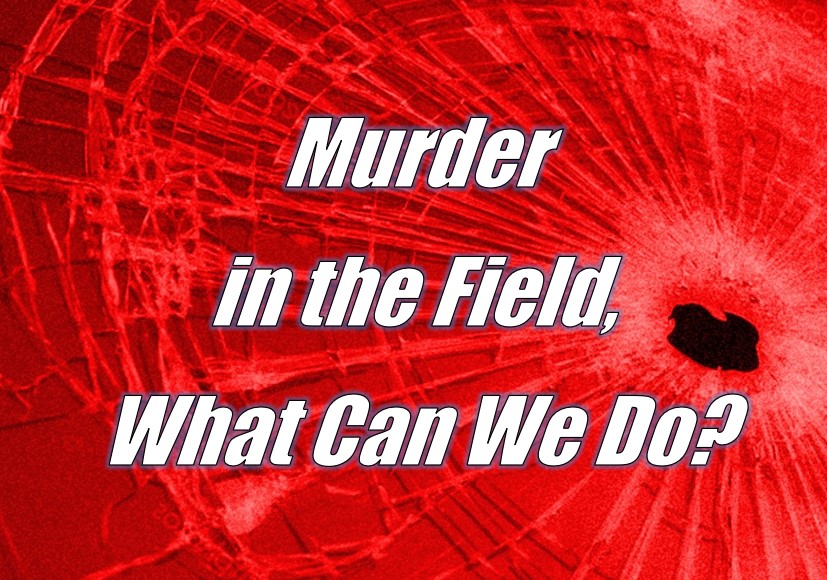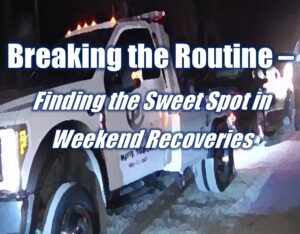Murder in the Field, What Can We Do?
Editorial
Five repossession agents murdered in less than four months and even more shot and wounded. All any of us can do is shake our heads in disbelief, make GoFundMe donations to cover funeral expenses and pray it doesn’t happen to any of us, our coworkers or friends. Maybe more needs to be done than that.
This has always been a dangerous industry. But this level of violence over such a short period of time is not normal. Something out there has changed.
It’s always been common sense in our business that no car is worth getting killed for. But it’s becoming clear that the borrowers are becoming more willing to kill for them. Much has changed in our world over the past few years and we must change too.
Dangerous Days
These are dangerous days for the repossession industry, and it is hard to believe that so many people have been killed in such a short period of time. In my researching a hundred years of news for Repo Blood, I never found a year with so many deaths. This is indeed unprecedented.
Michael Eusebio, owner of Digital Dog Recovery, once told me that the news on my website made him want to cut his wrist. That was ten years ago, and things are considerably worse now. I’m starting to feel the same as him.
What’s worse is that by no means do I report every violent incident that happens in the field. Most never get reported online. For however frequent you see stories of beatings, stabbings and gunfire, there are probably ten that I miss because the local press just isn’t interested in reporting it.
This complacency to the condition of the repo industry has been around since the beginning. Worse, many in the industry believe that these stories are bad for business. Well, perhaps they are right, but how do you fix what you aren’t willing to talk about?
I have to confess it is very uncomfortable for me to report so many stories about death and serious injuries in the repo industry. Especially in such a short period of time. It’s tragic and I am helpless to do anything to help except hopefully create some level of awareness to keep people on their feet. But that just doesn’t seem to be enough.
So, what can be done?
Redlining Assignments
Do agencies redline or refuse to work in specific neighborhoods because of high crime rates? Perhaps, but if you study the history of these events, they are not isolated to high crime areas. Bad things happen in nice places too. There is no safe place.
And of course, nobody would do it out of a FOMO.
Double Up
Should agencies require agents to work in teams of two? This might improve awareness of incoming danger, but aside from a little extra time to run or hide, it just creates one more additional victim. Besides, it’s also one more expense to the recovery. With fees as low as they are, this is just not economically feasible.
Guns
Maybe every agent should be armed at all times? Many do, where it’s legal, and some even where it isn’t.
This might help, but as we’ve seen in some cases, but simply carrying a gun does not stop a person from getting shot and often the best it can do is allow an agent to return fire. The problem is, the more gunfire that happens, the higher the probability is that an innocent bystander is hit.
Again, no car is worth getting killed for. But likewise, no car is worth getting an innocent bystander killed For. This is an option, but it comes with great risk.
In due time as incidents of armed agents get back to lenders, they will eventually frown on it and it would be a business killer.
Training
At the very minimum, safety training is a must. Eagle Group XX’s Situational Awareness and Confrontational Avoidance Techniques (SACAT) is available at no cost to all members of the asset recovery industry on the Allied Finance Adjusters web site.
The Eagle Group XX has also created a new training module on Confrontational Avoidance & De-Escalation Techniques (CADET). These programs encourage and instruct recovery agency employes to constantly remain alert, practice observance skills, develop good communication skills, stay mentally and physically strong.
As outstanding as these programs are, they can only protect an agent from gunfire so much. But at a bare minimum, I believe that all agents should be required to take these or comparable courses.
Protection
You rarely see it coming. It come from behind, it comes from the side and usually without warning. There is often no warning that you are about to come under fire. If it does happen, you are at the mercy of fate, luck if you will.
Survival of a gunshot wound depends greatly upon the area of the injury and can vary greatly in severity.
Some go in and out hitting no vital organs or arteries. Gunshot wounds to the head are usually fatal. Some hit the torso and deflect off bones taking dramatic twists and turns puncturing vital organs and arteries. Being the largest part of the body, torso wounds are most common.
Body armor is not perfect. Barring full body armor, a simple vest will not protect from a head wound or one to the extremities. Body armor may not stop all caliber rounds, but a simple bullet proof vest can save a life.
There are many objections that you may find to body armor, the greatest is comfort. They are a little stiff, they don’t breathe well and can make you sweaty underneath. The second objection is probably more common, Expense.
Body armor varies in costs ranging anywhere from $600 to $1600 depending upon protection level and material. For the average agent, this is a considerable expense. To the average agency owner, the expense of suiting up all of your agents is exponentially higher.
Body armor is not perfect, but I believe that it should become a standard in the industry. Expense should never be an excuse when it comes to safety.
Not Just Another Number
No one should ever just think of a repossession agent as just another casualty or just another number. Our agents are fathers, brothers, sisters and mothers, friends and neighbors and valuable kind, good hearted people. You cannot put a price tag on their lives and value in our world.
As mentioned earlier, we all have big hearts when it comes to stepping up to fund an agent’s funeral or cover their medical expenses. So why don’t we step up to invest in saving their lives?
Instead of everyone stepping up after something terrible happens, maybe it’s time that someone establishes an agent safety fund. A fund to provide body armor for all professional agents regardless of association affiliation or company size.
While we may never know how many lives it could save, if we’re lucky, we may eventually come to know how many survived from it.
I don’t profess to have the answer to all this violence, but I believe that it is time that someone out there take action. You can put a price on a funeral and you can put a price on a surgery, but you cannot put a price on a life.
Kevin Armstrong
Publisher











More Stories
Repo Agent Wrestles Shotgun from Borrower
Bad Apples in the Repossession Industry
Repo Rampage in Rural Texas
Why Self-Help Repossession Is Taken for Granted — and Why Losing It Would Hurt Consumers Most
Arrest Made for Attempted Murder of Repossession Agent
A Necessary Distinction: Financial Oversight vs. Financial Control